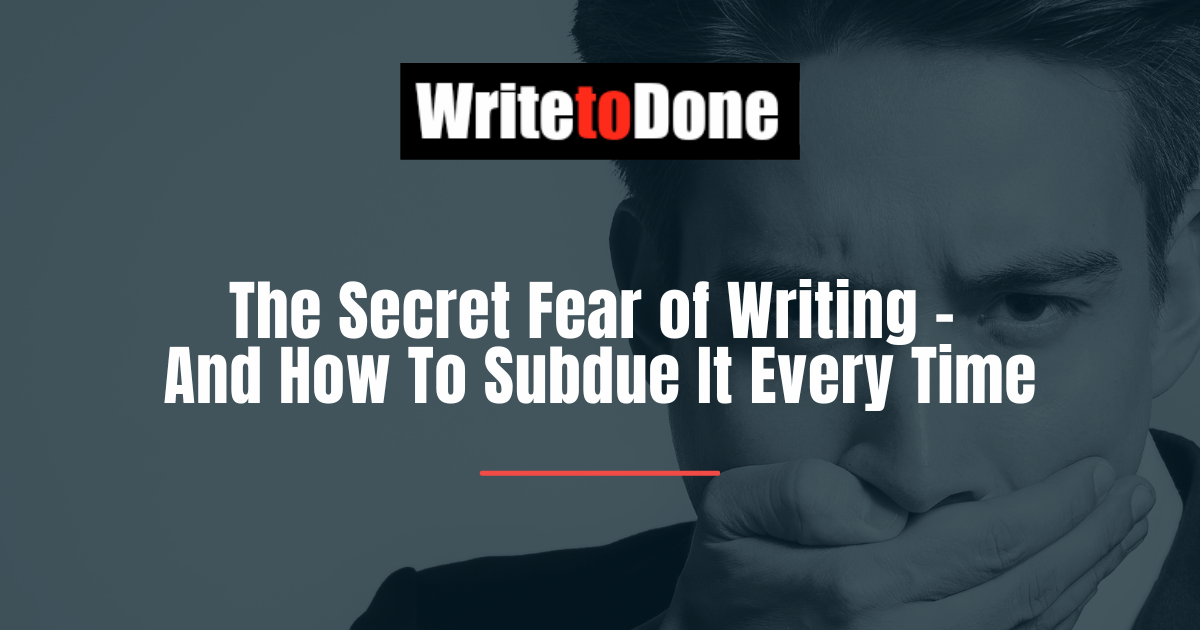Do you have a fear of writing?
Do you sometimes sit in front of a blank screen and wonder why your brain just isn’t working?
I can almost hear your response: “all the time”, “in certain situations”.
I think very few writers could respond to that question with a resounding “no”.
I’ve had two conversations this week with would-be writers. The first believes he could write, with just a little practice, but finds every time he sits down that he just doesn’t know where to begin.
The second would love to write, but believes the craft is reserved for those who are ultra creative and talented, so she doesn’t even try.
Both those attitudes scream fear.
Most of us recognize and understand this fear. It’s a fear of the unknown. We feel it when we take a new route in life. And if the fear is successful in overpowering us, we back-pedal right away.
But what about those of us who aren’t new to writing and still feel fear?
Removing the Fear of Writing
Fear is talked about a lot in the writing world.
Often we’ll apply a one-size-fits-all Band-Aid, and blame our fear on a momentary lack of inspiration or writer’s block, which may well be the case on some days. But more often than not, we’re dealing with the kind of fear we won’t admit to, or may not even be aware of.
The fear I’m talking about isn’t to do with writer’s block or lack of creativity.
It’s about believing we have something worthwhile to say.
Comparison—the thief of creativity
When we doubt the worth of our words, it’s a pretty safe bet that we’re comparing their value to the words of other authors and bloggers. Comparison is deadly, yet it seems to be inherent in human nature.
If we look at what other writers have to say and value it above our own work, we create a barrier between the page and our authentic words. It’s a paralyzing barrier.
The healthiest type of comparison is to compare our work with our previous efforts and try to build on that.
Why we don’t talk about it
We don’t talk about this hidden fear because if our life is writing, then everything we are is wrapped up in what we have to say. If we doubt what we have to say, don’t we then doubt who we are?
Well, no.
Every writer –every person who shares their art—doubts the value of their work at some point in their career. But doubting what we do is different from doubting who we are.
To write is to take risks
Every time we sit down to write, we take a risk.
– We risk our words being rejected.
– We risk our work being compared to others’.
– We risk revealing parts of ourselves we may not want others to see.
That’s the nature of creativity; we’re sharing a part of ourselves. And sharing who we are is always risky because it makes us vulnerable.
But we keep going, encouraged by our audience and ignited by our passion.
That doesn’t mean we’ll always deliver according to expectations, be it the reader’s or ours.
When an audience is waiting for your words
Every artist has off days.
Think of your favorite musician. I bet you can think of a few songs or even albums that haven’t made it to the iTunes popularity bar; the ones that didn’t really inspire you.
Even well-known authors have books that don’t harvest the reviews they may be expecting.
I’ve seen it happen. I’ll pick up a book by an author I like and there’s a certain expectation. But sometimes I feel let down. I think, “This is not good. Not up to their usual standard. How did this even get past an editor?”
Sometimes we can become complacent with our writing. Often the reader will forgive. At other times it may result in a big fat ‘F’.
The scenario we feared actually happens. It’s normal. Not all of our work will be received with open arms.
The question is: how will we take that experience and use it to better ourselves as artists?
Connecting with your reader
Reaching that place of vulnerability after a setback, or even doubting the value of our words, is a good thing. It puts us back on track and helps us to re-evaluate our goals.
The last thing we want as writers is to be sitting up a tree far out of reach of our audience. In that place, we are unable to hear what they want or need from us.
But when we sit in the fear, ground ourselves, and hang out with the people who scare us the most, we are forced to listen. And then we write what we believe will be valuable for our readers.
If your reader has come to value your words, they will keep valuing them—unless you deliver something completely off the wall that doesn’t align with your voice, style, or who you are.
Writing through the fear
Writing takes courage.
Of course if you’re writing an article about French cuisine or fitness, it’s not such a courageous feat. But if neither topic is your passion, then that’s not where your fear is going to be either.
If you’re passionate about recycling, you’re going to inspire others to be passionate about recycling. Your best work is where your passion lies.
With passion comes emotion. And with emotion comes vulnerability.
If you embrace openness in your writing you’ve done the best you can do. Your only responsibility is to say what’s in your heart and be true to yourself, your audience, and your subject.
After that the world can do what it likes with your words.
Do you sometimes compare yourself to writers you admire? When you doubt the value of your words, what helps you write through the fear? Join the conversation in the comments below!
















